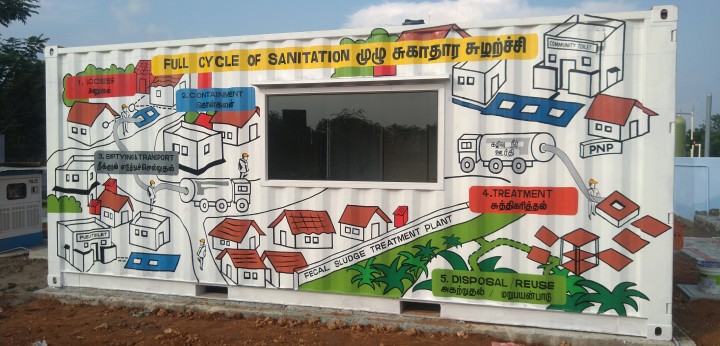Tamil Nadu Urban Sanitation Support Programme - Phase II (TNUSSP) Scaling up Fecal Sludge Management across Tamil Nadu
Indian Institute for Human Settlements
IIHS
The second phase of the IIHS led- Tamil Nadu Urban Sanitation Support Programme (TNUSSP) is focused on the scale up Fecal Sludge Management (FSM) solutions across Tamil Nadu covering 663 Urban Local Bodies (ULBs) and a population of 25 million people.
TNUSSP is supporting improvements along the entire urban sanitation chain in the State with the aim to strengthen and sustain safe sanitation services for all. The key activities in this phase of the programme include technical assistance to the local, regional and state entities for implementation and operationalisation of sanitation treatment facilities; streamlining of desludging services; capacity building of multiple stakeholders; strengthening inclusivity of service delivery; improving livelihoods, health and welfare of sanitation workers; and Behaviour Change and Communication, among others. Key activities carried out in this phase of the programme are
• Fecal sludge & septage treatment facilities across the state
• Co-treatment at Sewage Treatment Plants
• Governance mechanisms to operationalise and sustain the O&M of shared treatment facilities and desludging services
• Digital platform for monitoring implementation and service delivery
• Technical assistance workshops and exposure visits
• Capacity building initiatives & Training programmes
• Conferences/Workshops
• Technical Reports
• Policy papers
• Policy briefs
• Multimedia outputs (Films, Audio clips etc)
• Posters
• Webinars
• Social media campaigns
• Behaviour Change and Communication campaigns

Mission
The long term vision of this programme is that urban Tamil Nadu will be poised to becoming a fully sanitised and healthy state, substantially eliminating open defecation, achieving improvements in services through the entire sanitation value chain, and able to safely dispose an increasing proportion of its human excreta, and re-use/ recover resources therefrom. The goal is to demonstrate measurable improvements along the entire urban sanitation chain in Tamil Nadu, and strengthen institutional capacities for promoting inclusive sanitation with a focus on improved access for the urban poorFurther comments
Gayathri SaranganDiscussion on SuSanA discussion forum (Phase I and II together)
Answer questions about the project
Gayathri Sarangan
gsarangan@iihs.ac.in
Kavita Wankhade
kwankhade@iihs.co.in
Anneka Majhi
amajhi@iihs.ac.in
Filter / Tags
Capacity developmentCitiesCommunity sanitationOperation, maintenance and sustainable servicesBehaviour changePolitical processes and institutional aspectsSpecific to one or several countriesToilets or urinals (user interface)Emptying and transport (non sewered)Treatment of faecal sludgeEnabling environment and institutional strengtheningFaecal sludge treatment processesBill & Melinda Gates FoundationUrban (entire city)Politicians and local decision makersUniversity, education or research institution
Related Countries
India
Downloads

Project location
